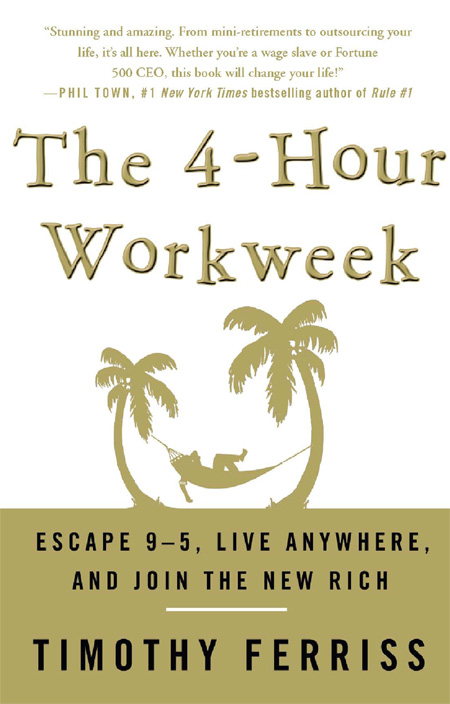危 wēi danger
Timothy Ferriss, an American writer, educational activist, and entrepreneur wrote a semi-autobiographical self-help book in 2007 that was well received by friends and family. Ferriss’ working title, ‘Drug Dealing for Fun and Profit’, wasn’t as well received. He decided to proceed with the name anyway, liking it because it polarized opinion. However, once he had secured distribution, Wal-Mart vetoed the title’s use so Ferriss was back to the drawing board. He found it relatively easy to whittle the list down to 12 but found it tough to select a final name: everyone had an opinion on the best, including his agent and distributor but none agreed. Surely he would be best going with his gut feel and upsetting either his distributor or agent?
机 jī opportunity
Instead, Ferriss decided to look for some data. He took 6 prospective titles that everyone could live with: including ‘Broadband and White Sand’, ‘Millionaire Chameleon’ and ‘The 4-Hour Workweek’ and developed an Google Adwords campaign for each. He bid on keywords related to the book’s content including ‘401k’ and ‘language learning’: when those keywords formed part of someone’s search on Google the prospective title popped up as a headline and the advertisement text would be the subtitle. Ferriss was interested to see which of the sponsored links would be clicked on most, knowing that he needed his title to compete with over 200,000 books published in the US each year. At the end of the week, for less than $200 he knew that “The 4-Hour Workweek” had the best click-through rate by far and he went with that title.
His experimentation didn’t stop there, he decided to test various covers by printing them on high quality paper and placing them on existing similar sized books in the new non-fiction rack at Borders, Palo Alto. He sat with a coffee and observed, learning which cover really was most appealing.
My colleague in New York, Joe Gerber has been using this approach recently with real success, it’s a reminder to me that every part of a business (including the virtual) can be prototyped.
How About…
- Prototyping every part of your business before launch?
- Placing advertisements into existing online networks before launch for feedback? e.g. as Joe says how about using Foursquare to figure out “if this is worth stopping for?”
—
source video: http://vimeo.com/3934635

11 Responses to “64) The 4-Hour Workweek – smoke test in the physical world”
HOWTO use Google AdWords to prototype and test a book title - Boing Boing
[…] Palo Alto. He sat with a coffee and observed, learning which cover really was most appealing. 64) The 4-Hour Workweek: Escape 9-5, Live Anywhere, and Join the New Rich (Thanks, […]
James M
Timothy Ferriss is currently holding a competition to develop an advertisement for his latest book, The Four Hour Body, and recommended people follow a lot of the same principles he used to create the title for his first book. The ads are being posted on his Facebook Fan page, and some are truly hilarious.
http://www.fourhourworkweek.com/blog/2010/10/13/4-hour-body-experiment/
http://www.facebook.com/timferriss
Tom
Thanks for pointing that out James. It’s clear that he’s done a good job of aligning incentives but I wonder if they seem a little unbalanced. Is a trek pack enough?
Creative ways to use AdWords | Fight
[…] fantastic way of using the tools that are out there in creative ways, read the full story here. veryMickey blog comments powered by Disqus […]
Nathan
Great article Tom, i love this approach. It reminds me of this which I saw recently for doing a similar thing, but taking the idea a little further and testing visual treatments in a A/B scenario testing approach, allowing you to see how small changes can make a big difference. http://visualwebsiteoptimizer.com/.
Dylan Schiemann » Blog Archive » Random Thoughts from 2010 for 2011
[…] An uncommon guide to rapid fat-loss, incredible sex and becoming superhuman. I wonder if he again used AdWords to choose the book title? Or is Facebook Questions or a Facebook ad campaign or a set of Twitter links the new way to test a […]
Crowdfunding case studies - Chris Unitt's blog
[…] reminded me of this post about using Google Ads to test prospective book titles. Slightly off topic, but worth […]
5 Great Conversion Rate Case Studies | distilled
[…] post, as well as an annotated version of the winning landing page.4. Four hour work week book titlehttp://weijiblog.com/2010/10/64-the-4-hour-workweek-escape-9-5-live-anywhere-and-join-the-new-rich/This example shows that some of the ideas behind CRO and split testing can be applied to more than […]
5 Great Conversion Rate Case Studies | Reputation Expert
[…] http://weijiblog.com/2010/10/64-the-4-hour-workweek-escape-9-5-live-anywhere-and-join-the-new-rich/ […]
What I’ve been reading online recently | Philip Gamble: freeg131
[…] Using Adwords for Market Research. […]
Creating a Best Selling Book Title: Market Research for Publishing | Instant.ly Blog
[…] Tim Ferriss, the mind behind two number one New York Times bestsellers has discussed how he split test covers and titles for his book by sneaking into a bookstore and covering existing […]